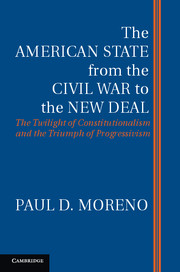 The American State from the Civil War to the New Deal
The American State from the Civil War to the New Deal Book contents
- Frontmatter
- Contents
- Abbreviations Used in the Footnotes
- Acknowledgments
- Introduction
- Part I The Old Regime
- Part II Early Progressivism
- Part III Late Progressivism
- 11 Wilsonian Progressivism
- 12 The New Freedom
- 13 The New Wilson
- 14 The Great War
- 15 The Return of the Regular Republicans
- 16 The Taft Court
- 17 The Last Progressive
- Part IV The New Deal
- Appendix A
- Appendix B
- Primary Sources
- Index
- References
14 - The Great War
Published online by Cambridge University Press: 05 May 2013
- Frontmatter
- Contents
- Abbreviations Used in the Footnotes
- Acknowledgments
- Introduction
- Part I The Old Regime
- Part II Early Progressivism
- Part III Late Progressivism
- 11 Wilsonian Progressivism
- 12 The New Freedom
- 13 The New Wilson
- 14 The Great War
- 15 The Return of the Regular Republicans
- 16 The Taft Court
- 17 The Last Progressive
- Part IV The New Deal
- Appendix A
- Appendix B
- Primary Sources
- Index
- References
Summary
THE ARMY AND SOCIAL REFORM
“Once lead this people into war,” New York World editor Frank I. Cobb reported Wilson saying, “and they’ll forget there ever was such a thing as tolerance.” He thought the Constitution would not survive it. That free speech and the rights of assembly would go. Whether or not Wilson ever made this statement, the First World War showed that war was a boon to, not the nemesis of, progressivism. The progressive impulses of Theodore Roosevelt meshed perfectly with his militarism. But even progressives who professed pacifism recognized the benefits of war. In 1910, Harvard philosopher William James explained that progressives sought “the moral equivalent of war,” a cause that would inspire men to make in peacetime the same sacrifices they made in war. The martial virtues might no longer be needed for war, James argued, but remained “absolute and permanent human goods.” He hoped that the zeal that men had heretofore displayed in wars for plunder and glory could be turned to crusading against civil ills such as gross inequality. “Instead of military conscription,” James called for “a conscription of the whole youthful population to form for a certain number of years a part of the army enlisted against Nature.” James argued that “gilded youth” especially should be drafted to experience the life of the disadvantaged working classes. “The only thing needed henceforward,” James concluded, “is to inflame the civic temper as past history has inflamed the military temper.” In many ways, the First World War was the first New Deal, showing progressives the power that government could exercise in wartime. But America’s war was too brief. Later progressives would seek what historian William Leuchtenburg called “the analogue of war.”
- Type
- Chapter
- Information
- The American State from the Civil War to the New DealThe Twilight of Constitutionalism and the Triumph of Progressivism, pp. 163 - 176Publisher: Cambridge University PressPrint publication year: 2013


